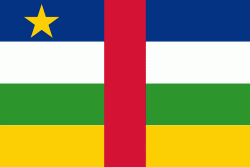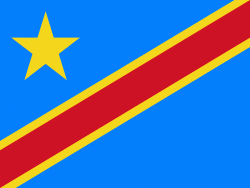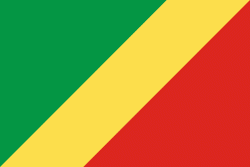Kongo language
Kongo or Kikongo is one of the Bantu languages spoken by the Kongo people living in the Democratic Republic of the Congo, the Republic of the Congo, Gabon and Angola. It is a tonal language. It was spoken by many of those who were taken from the region and sold as slaves in the Americas. For this reason, while Kongo still is spoken in the above-mentioned countries, creolized forms of the language are found in ritual speech of Afro-American religions, especially in Brazil, Cuba, Puerto Rico, the Dominican Republic and Haiti. It is also one of the sources of the Gullah language and the Palenquero creole in Colombia. The vast majority of present-day speakers live in Africa. There are roughly seven million native speakers of Kongo, with perhaps two million more who use it as a second language.
Kongo was the language of the Kingdom of Kongo prior to the creation of Angola by the Portuguese Crown in 1575 and the Berlin Conference (1884-1885) that balkanized the rest of the kingdom into three territories, which are now parts of the DRC (Kongo Central and Bandundu), the Republic of the Congo and Gabon.
Kikongo is the base for the Creole language Kituba, also called Kikongo de l'État and Kikongo ya Leta (French and Kituba respectively for "Kikongo of the state administration" or "Kikongo of the State"). The constitution of the Republic of the Congo uses the name Kituba, and the one of the Democratic Republic of the Congo uses the term Kikongo, while Kituba (i.e. Kikongo ya Leta) is used in the administration. This can be explained by the fact that Kikongo ya Leta is often mistakenly called Kikongo (i.e. KiNtandu, KiManianga, KiNdibu, etc.).
Kikongo and Kituba are spoken in:
* South of Republic of the Congo :
* Kikongo (Yombe, Vili, Ladi, Nsundi, etc.) and Kituba :
* Kouilou,
* Niari,
* Bouenza,
* Lékoumou,
Kongo was the language of the Kingdom of Kongo prior to the creation of Angola by the Portuguese Crown in 1575 and the Berlin Conference (1884-1885) that balkanized the rest of the kingdom into three territories, which are now parts of the DRC (Kongo Central and Bandundu), the Republic of the Congo and Gabon.
Kikongo is the base for the Creole language Kituba, also called Kikongo de l'État and Kikongo ya Leta (French and Kituba respectively for "Kikongo of the state administration" or "Kikongo of the State"). The constitution of the Republic of the Congo uses the name Kituba, and the one of the Democratic Republic of the Congo uses the term Kikongo, while Kituba (i.e. Kikongo ya Leta) is used in the administration. This can be explained by the fact that Kikongo ya Leta is often mistakenly called Kikongo (i.e. KiNtandu, KiManianga, KiNdibu, etc.).
Kikongo and Kituba are spoken in:
* South of Republic of the Congo :
* Kikongo (Yombe, Vili, Ladi, Nsundi, etc.) and Kituba :
* Kouilou,
* Niari,
* Bouenza,
* Lékoumou,
Country
-
Central African Republic
The Central African Republic (CAR; Ködörösêse tî Bêafrîka ; République centrafricaine, RCA;, or Centrafrique, ) is a landlocked country in Central Africa. It is bordered by Chad to the north, Sudan to the northeast, South Sudan to the southeast, the Democratic Republic of the Congo to the south, the Republic of the Congo to the southwest, and Cameroon to the west.
The Central African Republic covers a land area of about 620000 km2. , it had an estimated population of around million. , the Central African Republic is the scene of a civil war, which is ongoing since 2012. -
Democratic Republic of the Congo
The Democratic Republic of the Congo (DRC), also known as Congo-Kinshasa and formerly known as Zaire, is a country in Central Africa. By land area, the DRC is the second-largest country in Africa, after Algeria, and the 11th-largest in the world. With a population of around 112 million, the Democratic Republic of the Congo is the most populous officially Francophone country in the world. The national capital and largest city is Kinshasa, which is also the economic center. The country is bordered by the Republic of the Congo, Central African Republic, South Sudan, Uganda, Rwanda, Burundi, Tanzania (across Lake Tanganyika), Zambia, Angola, the Cabinda exclave of Angola and the South Atlantic Ocean.
Centered on the Congo Basin, the territory of the DRC was first inhabited by Central African foragers around 90,000 years ago and was reached by the Bantu expansion about 3,000 years ago. In the west, the Kingdom of Kongo ruled around the mouth of the Congo River from the 14th to 19th centuries. In the northeast, center and east, the kingdoms of Azande, Luba, and Lunda ruled from the 16th and 17th centuries to the 19th century. King Leopold II of Belgium formally acquired rights to the Congo territory in 1885 and declared the land his private property, naming it the Congo Free State. From 1885 to 1908, his colonial military forced the local population to produce rubber and committed widespread atrocities. In 1908, Leopold ceded the territory, which thus became a Belgian colony. -
Republic of the Congo
The Republic of the Congo (République du Congo, Republíki ya Kongó), also known as Congo-Brazzaville, the Congo Republic or simply either Congo or the Congo, is a country located on the western coast of Central Africa to the west of the Congo River. It is bordered to the west by Gabon, to its northwest by Cameroon and its northeast by the Central African Republic, to the southeast by the Democratic Republic of the Congo, to its south by the Angolan exclave of Cabinda and to its southwest by the Atlantic Ocean.
The region was dominated by Bantu-speaking tribes at least 3,000 years ago, who built trade links leading into the Congo River basin. Congo was formerly part of the French colony of Equatorial Africa. The Republic of the Congo was established on 28 November 1958 and gained independence from France in 1960. It was a Marxist–Leninist state from 1969 to 1992, under the name People's Republic of the Congo. The country has had multi-party elections since 1992, but a democratically elected government was ousted in the 1997 Republic of the Congo Civil War. President Denis Sassou Nguesso who first came to power in 1979 ruled until 1992 and then again from 1997 onwards.
